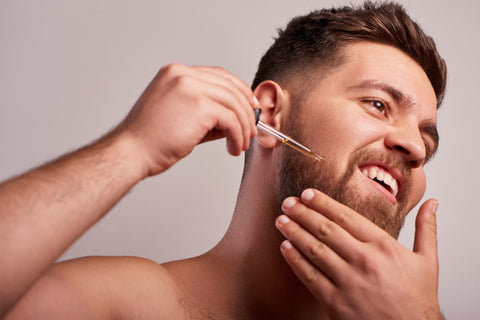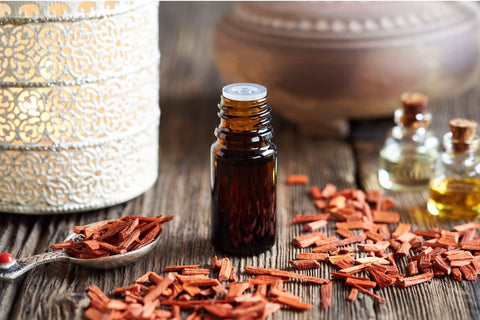Beards have been a pristine sign of maturity in men for ages. From ancient times to now, beards on men have been popularly liked by women all around. This is because the beards completely change the overall look of the being, irrespective of how long or short it is.
Therefore, the maintenance of beards is as important as it would be for our hair on the scalp. A well-trimmed and groomed beard always looks stylish and is appreciated by the onlookers. However, it is really important to take care of the beard’s growth to maintain proper hygiene.

Just like our scalp hair, beard hair can also have itching, redness, dandruff, and various other infections. For the best possible beard care, never forget to use a good homemade beard growth oil that facilitates proper healthy hair growth and prevents rashes. Let us see a very useful and effective DIY recipe of beard oil that can be done at home in just a few easy steps.
How to Make Beard Growth Oil at Home
DIY recipes are the easiest recipes that you can make with the help of essential oils. You can get such effective products to keep at your home in just a few easy steps and use them as often.
Beard oil has been really important to take care of the beard’s growth and health. For maintaining a proper hygienic beard, the oil is used to prevent rashes and other skin ailments. Homemade beard oil recipe has very few steps and is made of all-natural ingredients. Let us see more about it below.

Homemade Beard Oil Recipe Ingredients
Ingredients play an essential part in the recipes. The quantity and quality of the ingredients matter a lot. The ingredients used in making homemade beard oil are safe and completely natural.
- Sweet Almond Oil - 4 Tablespoons
- Sweet Orange Essential Oil - 3 Drops
- Cajeput Essential Oil - 2 Drops
- Sandalwood Essential Oil - 2 Drops
- Cassia Essential Oil - 1 Drop
Know About DIY Natural Beard Oil Ingredient
It is always a fun fact to know about the ingredients you would use to create a recipe at home. The ingredients used in this recipe are mostly essential oils that have a lot of benefits for both skin and hair. Let us know more about these pristine ingredients below.

- Sweet Almond Oil: Sweet almond oil is a key part of blending. They are used along with essential oils because of their properties to aid physical and emotional health issues. Sweet almond oil is the diluted concentrated essential oil that people can apply to their skins without experiencing any side effects.
- Sweet Orange Essential Oil: Collagen production is promoted by the usage of Sweet orange essential oil. The essential oil can be used in various applications that help in reducing stress and anxiety. The oil also helps to uplift mood and adds a fresh citrus aroma to the room. In addition, the oil has amazing antimicrobial properties that help in pain relief.
- Cajeput Essential Oil: Cajeput essential oil is used to cure skin issues. It helps to regenerate tissues. It removes all the dead skin cells and is completely immune-supporting. The essential oil helps in healthy respiratory functioning and works wonders on all skin types. Cajeput essential oil is used to cure all skin infections and has enormous properties to calm the mind and body.

- Sandalwood Essential Oil: It's an excellent cleaning astringent that improves the skin's capacity to retain moisture. The hydration of the skin is maintained by using this essential oil. The sandalwood has medicinal properties that help make it the best skincare essential oil. It heals skin infections and has anti-inflammatory qualities. The oil is a go-to ingredient and is completely anti-microbial.
- Cassia Essential Oil: Cassia essential oil helps strengthen the hair roots follicle. In addition, the oil promotes skin circulation and stimulates and warms the skin. The cassia oil is used as pain relief to cure chest pain, kidney disorders, cancer, and cramps. The oil also helps to repel mosquitoes and is also used as a flavoring agent.
Homemade Beard Oil with Essential Oils - Steps Wise
Recipes play an important role in the DIY process of creating any recipe with essential oils. In a few simple steps, you may have a great product that can be used for several days.

In addition, an easy application of the product anytime at home can simply be attained with the help of good recipe steps. So, let us check out the steps of this valuable recipe below.
Step 1: In a bowl, add all the ingredients mentioned above.
Step 2: Mix all the ingredients very well together.
Step 3: Once the mixture is attained, transfer it to a small glass bottle.
Step 4: Shake the glass bottle well.
Step 5: With the help of a dropper, apply a few drops to the beard.
Step 6: You may put some drops of the oil in your hands and then massage your beard.
How to Use: After mixing the ingredients, simply transfer them to the small glass bottle. Then, with the help of a dropper, apply a few drops on the beard and massage gently; for the best results, apply the oil regularly.
Conclusion
However, the growth of the beard depends on its good maintenance, and beard oil should be applied regularly. Use homemade beard oil to make it dense, all groomed, and shinier for suitable beard growth.
Homemade beard oil is one of the most popular and effective oils to groom the beard. It is completely natural and prevents rashes and redness on the skin. The oil even combats the problem of dandruff on the beard and helps to make it softer.












 Sign in
Sign in Register now
Register now My Reward Points
My Reward Points









